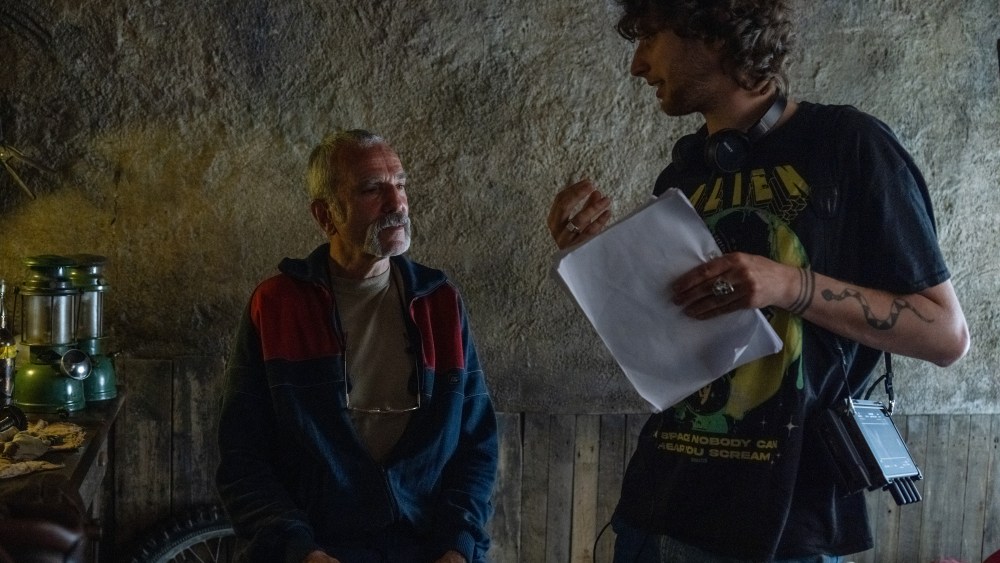Daniel Day-Lewis is legendary for going to punishing lengths to deliver authentic performances. He made the crew carry him around while playing wheelchair-bound Christy Brown in “My Left Foot,” spent a month in the wilderness to transform into an outdoorsman for “The Last of the Mohicans,” and devoted two years to studying dress making to become a fashion designer for “The Phantom Thread.” On set, the acting GOAT always stays in character, expecting everyone, directors included, to refer to him by his character’s name, even if the director is his son, Ronan Day-Lewis.
“It was intuitive that everyone called him Ray on set, and I did too,” Ronan Day-Lewis says of his dad’s immersive approach to playing a hermit living with a terrible secret in their new film, “Anemone.” “But obviously I was also seeing him all the time offset, and that would have been a bit weird if I was calling him Ray then. It was Dad offset, always Dad.”
Growing up, Ronan Day-Lewis admits he never fully understood what his father did when he took on all those Method acting challenges.
“His work was so mysterious to me,” he says. “It was always kind of behind a curtain. Others mythologized him and I absorbed that. He’s my dad, but then also he had this other life that he would kind of disappear into in these films he would do. Getting to see that process from this completely different vantage point was pretty thrilling. There were aspects of it that are still a mystery to me, because so much of what he does and the way he works to makes these people feel like real human beings is kind of mystical.”
The 27-year-old Ronan Day-Lewis knows how it looks that his first feature as a director stars his Oscar-winning father, but that wasn’t the plan. He was set to make a different film in Germany, only to see the funding collapse at the last minute.
“I knew that the baggage that would be attached to working with my dad and also the pressure that would be attached to that,” he says. “I definitely had some ambivalence. I wanted to carve my own path, and I foresaw how it might be perceived. There’s rightfully been a lot of talk about nepotism.”
Ultimately, he brushed aside any concerns of being called a “nepo baby” and took the leap. It helped that he had success in his own right as a painter, exhibiting in major galleries in New York and Los Angeles. And he reasoned he couldn’t turn down the opportunity. “It’s such a cosmically lucky thing to be able to work with your parent in this way. Ten years from now, I’d be kicking myself if I’d passed it up.”
It was Daniel Day-Lewis who first proposed finding a project that they could make together. Both men had been independently toying with the idea of doing something about brothers. “The archetype of brotherhood and the beauty and tragedy of that archetype felt like something we wanted to explore,” Ronan Day-Lewis says.
“Anemone,” which opens in limited release on Oct. 3, is the story of two estranged siblings (Daniel Day-Lewis and Sean Bean) who reunite to deal with a family crisis. It took Daniel and Ronan Day-Lewis four years to hone the script.
“We did an outline first,” Ronan says. “Then we worked in fits and burst. We would only write when we were in the same place, and we’d often be in different locations for long periods of time, which gave us distance from it. So by the time we came back together, the appetite built up again, and we could push the characters a little bit further into the dark.”
As they worked, Daniel Day-Lewis would improvise as Ray and Ronan Day-Lewis would fine-tune the dialogue he came up with on the fly. Eventually, they realized they were ready to make the leap.
“The bones were there and that was terrifying, because suddenly it all became very real,” says Ronan Day-Lewis.
What they came up with was a moody, spare chamber piece. Ray is living off-the-grid in the woods when Bean’s character tracks him down, trying desperately to convince him to return to civilization. Much of the movie is silent, as the two brothers circle each other gingerly. But when Ray does drop his guard, he does so in a torrent of words, delivering searing monologues, in which he describes past abuses and mistakes that have left him cut off from the world.
“It’s a story about withholding information,” says Ronan Day-Lewis. “It comes out in drips at first and then there’s an explosion, because when it rains, it pours.”

